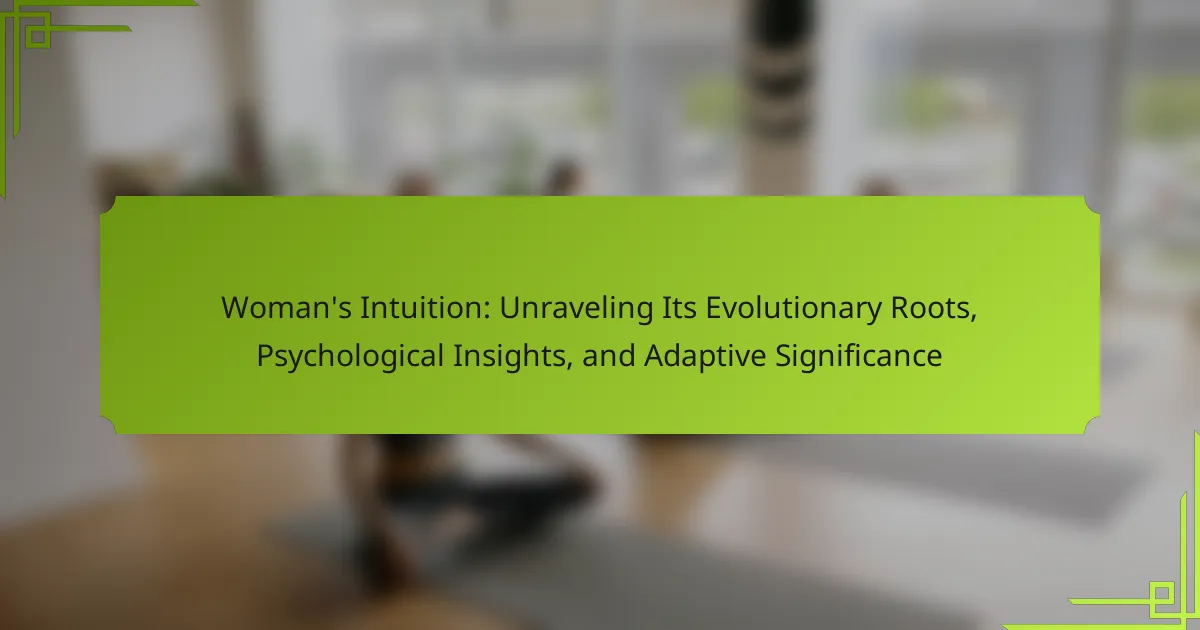Understanding women’s intuition can enhance decision-making and improve interpersonal relationships. This article explores its evolutionary roots, psychological insights, and adaptive significance. It highlights the unique attributes of emotional awareness and social perception that define this instinctual ability. Additionally, it examines how these traits contribute to effective communication and social cohesion in modern contexts.

What is Women’s Intuition and How is it Defined?
Women’s intuition refers to the innate ability of women to perceive or understand situations instinctively. This phenomenon is rooted in evolutionary psychology, suggesting it developed as an adaptive trait for social bonding and survival. Research indicates that women’s intuition often involves heightened emotional awareness and empathy, allowing for better interpersonal connections. Additionally, studies show that women may process emotional cues more effectively, enhancing their intuitive capabilities.
What are the Psychological Theories Behind Women’s Intuition?
Women’s intuition is rooted in psychological theories that emphasize emotional intelligence and social cognition. This intuitive ability often stems from evolutionary adaptations, enhancing survival through quick decision-making. Psychological insights reveal that women may process emotional cues more effectively, allowing for heightened awareness in social contexts. Studies indicate that this skill is linked to unique attributes such as empathy and relational understanding, reinforcing adaptive significance in personal and professional environments.
How Does Evolutionary Psychology Explain Women’s Intuition?
Evolutionary psychology suggests that women’s intuition stems from adaptive traits developed for survival and social cohesion. This intuition enhances decision-making by integrating emotional and social cues, which historically benefited women’s roles in nurturing and community-building. Research indicates that women often excel in recognizing non-verbal signals, reflecting evolutionary advantages in communication and relationship management. These insights underscore the significance of intuition as a vital psychological tool shaped by ancestral environments.

What Universal Attributes Characterize Women’s Intuition?
Women’s intuition is characterized by a combination of emotional awareness, social perception, and instinctual decision-making. These universal attributes enable women to assess situations and understand others’ feelings effectively. Emotional awareness allows for a deeper connection to personal and others’ emotions, enhancing empathetic responses. Social perception facilitates the interpretation of non-verbal cues, which are crucial in interpersonal interactions. Instinctual decision-making often leads to quick, gut-based judgments, reflecting an adaptive significance rooted in evolutionary psychology. These attributes collectively contribute to the unique nature of women’s intuition in various contexts.
How Does Emotional Intelligence Relate to Women’s Intuition?
Emotional intelligence enhances women’s intuition by fostering deeper emotional awareness and empathy. This connection allows women to interpret subtle social cues effectively. Research indicates that women often excel in emotional perception, which is rooted in evolutionary adaptations for social bonding and caregiving. By understanding emotions, women can navigate complex interpersonal dynamics, making intuition a valuable adaptive skill.
What Role Does Socialization Play in Developing Intuition?
Socialization significantly enhances the development of intuition by fostering emotional intelligence and social awareness. Interactions with others help individuals recognize patterns and cues, refining their intuitive abilities. This process is particularly evident in women, who often exhibit heightened intuitive skills due to socialization experiences that emphasize empathy and relational dynamics. As a result, social contexts serve as a training ground for honing intuitive insights, crucial for adaptive decision-making in complex environments.

What Unique Aspects Differentiate Women’s Intuition from Other Forms of Intuition?
Women’s intuition is often characterized by its deep emotional awareness and social sensitivity, setting it apart from other forms of intuition. This unique attribute stems from evolutionary roles that favored empathetic communication and relational understanding. Research indicates that women may process emotional information differently, leading to heightened intuitive capabilities in social contexts. As a result, women’s intuition can be seen as an adaptive trait, enhancing interpersonal relationships and decision-making in complex social environments.
How Do Gender Differences Influence Intuitive Abilities?
Gender differences significantly influence intuitive abilities, often manifesting as enhanced emotional awareness and social cognition in women. Research highlights that women typically outperform men in tasks requiring empathy and emotional intelligence, attributed to evolutionary roles and socialization patterns. Studies indicate that women are more attuned to non-verbal cues, facilitating stronger interpersonal connections. This adaptive significance suggests that intuitive skills may have evolved to enhance social cohesion and cooperative behaviours within communities.
What Cultural Factors Shape Perceptions of Women’s Intuition?
Cultural factors significantly influence perceptions of women’s intuition. Societal norms often frame intuition as a feminine trait, linking it to emotional intelligence and empathy. In many cultures, this view is reinforced through storytelling and media, portraying women as more intuitive than men. Historical contexts, such as women’s roles in caregiving, further shape these perceptions, emphasizing intuition as a survival mechanism. Additionally, education and socialization impact how individuals value or dismiss intuitive insights, with some cultures celebrating it while others may regard it skeptically. These cultural narratives ultimately affect how women’s intuition is understood and utilized across different societies.

What Rare Attributes Are Associated with Women’s Intuition?
Rare attributes associated with women’s intuition include heightened emotional awareness, an ability to read non-verbal cues, and an instinctive understanding of social dynamics. These attributes may stem from evolutionary pressures that favored communication and empathy in social groups. Research indicates that women often excel in recognizing subtle emotional shifts, which enhances their intuitive decision-making. Additionally, studies suggest that women’s intuition may be linked to greater brain connectivity in areas related to emotional processing.
How Does Intuition Manifest in High-Stress Situations?
Intuition often manifests as a heightened awareness and quick decision-making in high-stress situations. This instinctive response can be traced to evolutionary roots where survival depended on rapid assessments. Psychological insights suggest that this form of intuition is shaped by both experience and emotional intelligence. Adaptive significance is evident as it allows individuals, particularly women, to navigate complex social dynamics effectively, enhancing their ability to respond to threats.
What Are the Psychological Impacts of Ignoring Intuition?
Ignoring intuition can lead to negative psychological impacts, such as increased anxiety and diminished decision-making capabilities. Research indicates that neglecting intuitive insights may hinder emotional well-being and self-trust. This disconnection can result in a reliance on external validation, which often exacerbates stress and uncertainty. Ultimately, recognizing and valuing intuition can enhance psychological resilience and personal empowerment.

What Adaptive Significance Does Women’s Intuition Hold in Modern Society?
Women’s intuition plays a crucial adaptive role in modern society by enhancing interpersonal relationships and decision-making. This intuitive ability, often linked to evolutionary psychology, enables women to assess social cues quickly, fostering better communication and collaboration. Research indicates that women’s intuition can lead to improved conflict resolution and empathetic responses, which are vital in both personal and professional settings. As a result, this instinctual skill supports social cohesion and nurtures community bonds, demonstrating its significant adaptive significance in contemporary life.
How Can Women’s Intuition Enhance Decision-Making?
Women’s intuition can significantly enhance decision-making by leveraging instinctive insights and emotional intelligence. This ability often stems from evolutionary adaptations that prioritize social cohesion and survival. Research indicates that women may process emotional cues more effectively, leading to better interpersonal judgments. Furthermore, intuitive decision-making allows for quicker responses in uncertain situations, fostering confidence and adaptability. By recognizing and trusting their intuitive insights, women can navigate complex choices with greater clarity and effectiveness.
What Are Common Misconceptions About Women’s Intuition?
Many misconceptions about women’s intuition suggest it lacks scientific basis or is purely emotional. In reality, women’s intuition often stems from evolutionary adaptations that enhance social cognition and decision-making. Research indicates that women generally excel in reading nonverbal cues, leading to better interpersonal insights. This ability is rooted in long-standing societal roles that emphasize nurturing and communication. Misunderstandings arise when intuition is dismissed as mere guesswork rather than a complex interplay of experience and perception. Recognizing the adaptive significance of women’s intuition reveals its value in both personal and professional contexts.

How Can One Cultivate and Trust Their Intuition?
To cultivate and trust intuition, one must practice self-awareness and mindfulness. Engaging in reflective practices, such as journaling or meditation, enhances the ability to recognize intuitive signals. Understanding the evolutionary roots of women’s intuition reveals its significance in decision-making and social interactions. Psychological insights indicate that trusting one’s gut feeling can lead to better outcomes. Adaptive significance lies in using intuition to navigate complex environments effectively.
What Practical Tips Can Help Enhance Intuitive Skills?
To enhance intuitive skills, practice mindfulness and self-reflection regularly. Engaging in activities like journaling can clarify thoughts and feelings, strengthening intuition. Additionally, trusting gut feelings in decision-making fosters confidence in intuitive insights. Seeking diverse experiences broadens perspective, enhancing intuitive understanding.
What Common Mistakes Should Be Avoided When Relying on Intuition?
Relying on intuition can lead to significant errors if certain common mistakes are made. Overconfidence in gut feelings often results in dismissing critical information. Ignoring context and relying solely on past experiences can skew judgment. Additionally, failing to seek diverse perspectives may limit understanding, leading to biased decisions. Finally, neglecting to validate intuitive insights with data can result in poor outcomes.
